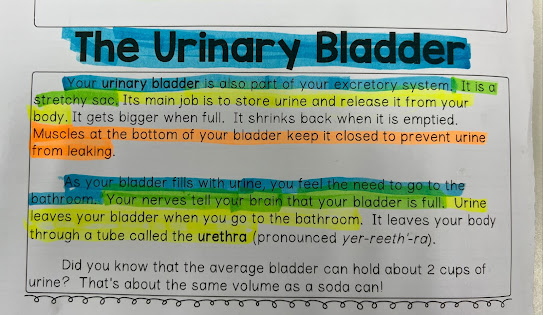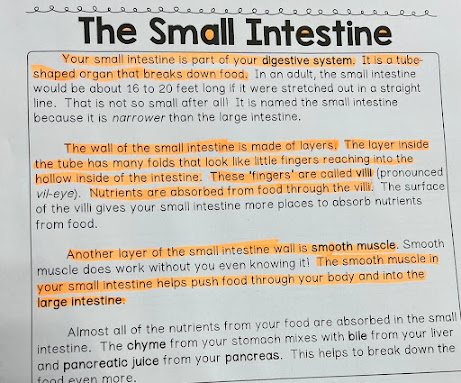Tuesday, February 28, 2023
Wednesday, February 22, 2023
Wednesday, February 15, 2023
Monday, February 13, 2023
Sunday, February 12, 2023
Friday, February 10, 2023
Thursday, February 2, 2023
NS7.- The Stomach
The Stomach
Your stomach is part of your digestive system. It is a muscular sac located near the bottom of your ribcage, a little to your left. Place your hand below your ribcage and then move it slightly to the left. That is where your stomach is located! Your body breaks down the food you eat into very small pieces so that it can absorb nutrients from the food. This is called digestion. Digestion begins in your mouth when you chew your food. When you swallow, the food travels through a tube called the esophagus (pronounced ee-sah’-fuh-gus). Muscles in the esophagus push your food to your stomach. In your stomach, bits of food mix with acid and other substances called enzymes that break down the food even more. This mushy mixture is called chyme (pronounced kime). Your stomach sends the chyme to your small intestine to be broken down even more. Have you ever heard your stomach “growl”? Those rumbly sounds have a funny-sounding name: borborygmi (pronounced bore-buh-rig’-me). The sound is caused by the muscles in the walls of your stomach and small intestine when they contract to push your food through your body. Next time you hear someone’s stomach “growl,” surprise them by telling them about borborygmi!
Video:
Game:
Digestive System
NS 6.- The Muscles
The Muscles
Your muscles are part of the muscular system. Your muscles
work together with the bones in your skeleton to allow you to move.
Your muscles give you strength and power!
One kind of muscle is skeletal muscle. These muscles make
movements that you make intentionally, or on purpose. For example, if
you decide to stand up, your skeletal muscles do the work. Skeletal
muscles work in pairs. When one muscle contracts, or squeezes, the
other one relaxes. This moves your bones. These muscles are
connected to your bones by tendons.
Another kind of muscle is smooth muscle. Smooth muscles do
work inside your body that you don’t have to think about. For example,
smooth muscles in your stomach push food through your digestive
system. You don’t have to do anything to get them to do their jobs.
They take care of it for you!
Another kind of muscle is cardiac muscle. The word cardiac refers
to the heart. Your heart is actually a muscle! This muscle pumps blood
through your body. It is the hardest-working muscle in your body.
Did you know that you have about 650 different muscles in your
body? Your muscles are equal to about half of your body weight! Your
muscles need to be active to stay healthy and strong. Give your
muscles the energy they need by eating healthy foods each day!
Videos:
Game:
NS 5.- The Lungs
The Lungs
Your lungs are located in your chest behind your ribcage. They play an important role in your respiratory system. Their job is to help take oxygen from the air you breathe and put it into your blood. Then your blood carries the oxygen to all parts of your body. Your lungs need a helper to do their work. That helper is a muscle called the diaphragm (pronounced “die’-a-fram”). Your diaphragm sits just below your lungs. When you breathe in, or inhale, air travels through your nose or mouth to your lungs. It travels through a tube called the trachea (pronounced “tray’-key-a”). When you inhale, your diaphragm squeezes, and your lungs expand with air. The air you inhale fills tiny sacs in your lungs. Many small blood vessels called capillaries (pronounced “cap’-a-lair-ees”) surround the air sacs in your lungs. Your lungs take oxygen from the air you breathe and give it to the blood in your capillaries. Then that blood travels to all parts of your body, delivering oxygen. Your lungs have another important job. They help remove a waste product called carbon dioxide from your body. Carbon dioxide is in the air that you breathe out, or exhale. Did you know that smoking cigarettes is very bad for your lungs? It makes it much harder for them to do their job. You can protect your lungs and keep them healthy. Get regular exercise, avoid air pollution, and never, ever smoke cigarettes!
GAMES
Respiratory System Game
Subscribe to:
Comments (Atom)
-
Simple Machines Word Search










